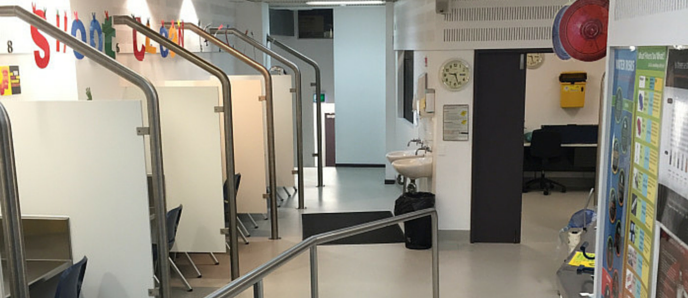
The vast majority of people who inject drugs and who are at the greatest risk of drug-related harm in Scotland would be willing to use drug consumption rooms (DCRs), according to a new study.
The Glasgow Caledonian University study is the first research of its kind in Scotland and the first national study to determine the willingness of people who inject drugs to use DCRs.
DCRs are professionally supervised healthcare facilities where people can consume drugs in safer conditions. They are used successfully in countries in Europe, Canada and Australia in response to public health crises among people who inject drugs.
The UK government reiterated its objection to DCRs at the UK Drug-Related Deaths summit, held in Glasgow in February.
Kirsten Trayner, lead researcher of the study which interviewed 1469 people who inject drugs, said: “Our findings suggest that this intervention has the potential to reach those most at risk of death and disease, which adds to existing evidence of the important role that drug consumption rooms could have in addressing the country’s drugs crisis.”
PhD researcher Kirsten said: “Willingness to use a drug consumption room was extremely high across all regions in Scotland and among key risk groups, including those who reported homelessness, cocaine injecting and public injecting. The vast majority of people said they would use a drug consumption room if it was introduced in their area. It shows that this intervention will attract those most at risk of different drug-related harms, particularly HIV and overdose in Scotland. They have the potential to make a big impact in areas where they are introduced.
“The case for drug consumption rooms on the impact they can have on drug-related harms alone is compelling. However, other research has shown that the voices of people who use drugs has been missing from the debate until now. We hope that this research contributes to the ongoing debate for the need for drug consumption rooms in Scotland, particularly in Glasgow.”
Results showed 75 per cent of people who inject drugs in Scotland were willing to use DCRs but higher among those interviewed in city centres including Glasgow at 83 per cent. Willingness was greater among people who reported injecting heroin (76%), cocaine (79%), and those with experiences of homelessness (86%), public injecting (87%) and recent overdose (80%).
The team also took dry blood spot tests which are tested anonymously for HIV and hepatitis C to help researchers better understand the prevalence of blood borne viruses among those involved in the study.
Kirsten said: “Drug consumption rooms are a really important intervention but it’s good to remember that they don’t hold the answer to all of Scotland’s problems with drug-related harms. They need to be implemented within a package of lots of different harm reduction interventions that includes easily accessible drug treatment, widespread availability of clean injecting equipment, and take-home naloxone for those at risk of overdose.”
